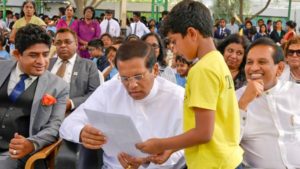
Sri Lanka’s President Maithripala Sirisena surprised many people by asking the Supreme Court (SC) whether he has “any impediment to continuing in the office of President for a period of six years.” Sirisena was elected to the office on January 8, 2015, for a term of six years because the constitution stated that the President “shall hold office for a term of six years.” To an uninformed observer, this might sound like an unnecessary or crazy question.
The problem is that Sirisena won the presidential election with the assistance of forces that wanted to re-restore democracy in the country. Sri Lanka drifted into an authoritarian mode of governance under the previous regime. The Sirisena-led coalition, which included a faction of the Sri Lanka Freedom Party (SLFP), the United National Party (UNP) and a number of small parties, promised a reform program within 100 days. Consequently, the 19th Amendment to the Constitution was introduced and approved in May 2015. The Amendment reduced the term of office of the president to five years.
The Amendment also allowed the President and the Prime Minister to continue in their respective offices “subject to the provisions of the Constitution as amended by this Act;” the 19th Amendment. Therefore, it was clear that the incumbent president should hold office for a term of five years. The Supreme Court confirmed this on January 14, 2018. By asking the question the President demonstrated his willingness to extend his term by one year.
Why Now?
President Sirisena was an enthusiastic participant of the democratization schemes undertaken by the government in power. If I remember correctly, Sirisena even stated that he was willing to reduce the presidential term to four years, instead of the five years eventually agreed upon. So, why does he want to stay in power for an extra year now? Sri Lankan media covered this story reasonably well. Yet, in my view, the question why the president wants an extra year was not answered adequately. One of the theories suggested that Faizer Mustapha, the minister in charge of Provincial Councils and Local Government, made Sirisena believe that he was entitled to an extra year and influenced him to approach the SC.
Nevertheless, it is possible that the presidential query was a result of discussions and examination of politics of the next presidential election, which will be held in 2020. The SC’s response to the question confirms the next election in 2020. It is possible that Sirisena does not foresee another term in office for several reasons. Therefore, he was trying to maximize the current tenure by staying in power for another year.
2020 Dilemmas
One, as soon as he was sworn in as president on January 9, 2015, Sirisena publicly proclaimed that he would serve only one term. This was a promise made to the country.
Two, even if the President decides to contest in 2020, winning could become really problematic. Currently, he does not have the full backing of his party, the SLFP. Former President Mahinda Rajapaksa has formed his own party called the Sri Lanka Podujana Peramuna (SLPP) and a portion of the SLFP members of parliament, provincial councils and local bodies are loyal to Rajapaksa. Rajapaksa also remains extremely popular among SLFP voters, especially in rural areas. The SLPP is contesting the forthcoming local government election separately. Rajapaksa and his party will be emboldened if they manage to win a large number of seats and bring several councils under their control. This will pose a serious challenge to Sirisena’s authority within the SLFP because more SLFP members will cross over to the Rajapaksa faction within and outside parliament.
Even if the SLPP does not score well in the local government election, Sirisena will lead a fractured SLFP in 2020 because of the fundamental policy and personal differences between Sirisena and Rajapaksa factions. Rajapaksa and his loyalists are extremely unlikely to accept Sirisena’s leadership even if the two factions come together as suggested by some party seniors. Sirisena will face a challenge from an SLPP candidate, probably a Rajapaksa brother because, according to the constitution, Mahinda Rajapaksa cannot contest in 2020. Compared to Basil Rajapaksa, Gotabhaya Rajapaksa is more popular among Sinhala voters. However, Gotabhaya’s candidacy could galvanize all pro-democracy and moderate forces in support of the opposition. Therefore, the possibility that Basil Rajapaksa will be fielded cannot be overruled.
UNP Support?
The point is, Sirisena cannot win the next presidential election without the UNP support. If this is true, the pertinent question is, whether the UNP will throw its weight behind Sirisena. As of today, the indications are that the UNP will be unlikely to back Sirisena for president in 2020. First, UNP leader Ranil Wickremesinghe has his own presidential ambitions and probably 2020 will be his last chance to give it another try.
Second, the current realities are different from the realities of 2015. In 2015, the UNP needed the proxy to unseat Mahinda Rajapaksa. In 2020, the UNP would not need a proxy and can field its own candidate. Moreover, in a three-way matchup involving the SLFP, SLPP, and UNP, the UNP’s chances are extremely promising. Therefore, there is no reason why the UNP should support Sirisena.
The crack between the UNP and Sirisena is already evident. The bond scam and the alleged involvement of some UNP members in it have already strained relations. Under pressure, the President is talking tough. According to newspaper reports, a UNP minister has called the president a thief or in his words a “pickpocket president.” In response, the president has walked out of the cabinet meeting. These issues could be a precursor to a permanent separation. In fact, the UNP might escalate confrontations as a strategy in the near future and the separation would become a reality sooner or later.
Therefore, the President may be thinking about his 2020 dilemmas when he asked the Supreme Court if he can stay in office until 2021.
